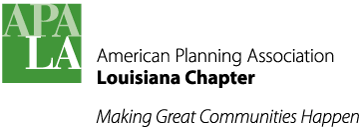Planners’ Day on the Hill

From September 17-20, APA held the 2016 APA Policy and Advocacy Conference in Washington D.C. During the three-day conference planners from all over the country discussed various planning and policy issues including: funding future transportation and infrastructure projects, using open data to increase access to opportunity, integrating equity into placemaking, planning for positive health outcomes for communities and advocating for planning with public and elected officials.
Over the course of the conference, two sessions stood out to me for their importance and relevance to planning in Louisiana. I had the pleasure to attend an amazing lunch plenary session with U.S. Department of Housing and Urban Development (HUD) Secretary Julian Castro. Secretary Castro gave a wonderful talk about HUD’s work with communities, advocacy organizations, philanthropic partners and planners in the development of the Prosperity Playbook, a tool that will be used to assist communities and regions in developing plans that promote economic opportunity, housing affordability, and inclusion. Additionally, Secretary Castro provided insight into updated requirements for communities developing their Consolidated Plans that address sustainability and resiliency. After Secretary Castro spoke we also had the privilege of hearing from Janette Sadik-Khan, the former commissioner of New York City Department of Transportation. Sadik-Khan shared her experiences in transforming streets and public spaces in New York City to create safer and more accessible areas for all pedestrians, bicyclists and public transportation.
I also attended a session titled Lessons from Health and Aging Advocacy. This session focused on how communities and regions can advocate for aging populations and address the needs of this cohort through policies and planning. One of the main ideas of this presentation is that planners should focus on the development of “livable communities for all ages”. One of the most insightful ideas presented during this session is that we should utilize “intergenerational-focused” ideas, policies and tools that engage all residents when planning for growth and development to make sure that aging populations have access to the same support and services as everyone else in the community. In March 2017, APA will hold a joint session with the American Society on Aging (ASA) at the Aging in America Conference in Chicago to continue this discussion.
I thoroughly enjoyed this conference and the opportunity to learn from and collaborate and advocate with other planners from all over the country.
Fred Neal Jr., AICP





